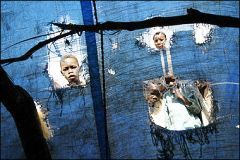Sudan is most dangerous place for children
July 11, 2006 (LONDON) — Sudan, Uganda and Congo are the world’s three most dangerous places for children due to wars that have brought death, disease and displacement to millions, a Reuters poll of humanitarian experts showed on Tuesday.

|
|
Sudanese displaced children are seen from inside a tent in the Internally Displaced Persons camp of Drage in Sudan’s southern Darfur region in 2004. |
The U.N. Children’s Fund (UNICEF) says 1.8 million children have been affected by a three-year conflict in Sudan’s western Darfur region, where they risk being recruited as fighters and are especially vulnerable to disease and malnutrition.
“It is a traumatised population and you can see it in the children’s faces,” said Hollywood actress and UNICEF goodwill ambassador Mia Farrow, who last month visited camps for some of the 2.5 million displaced by Darfur’s war.
“Everyone has lost family, seen villages burn, seen relatives raped, been raped.”
Reuters AlertNet, a humanitarian news Web site run by Reuters Foundation, asked more than 110 aid experts and journalists to highlight the most dangerous places for children.
After Sudan, they chose northern Uganda, Democratic Republic of Congo, Iraq, Somalia, India, the Palestinian territories, Afghanistan, Chechnya and Myanmar.
UNICEF says more than 2 million children worldwide have died as a direct result of armed conflict in the past decade, and about 20 million have been forced to flee their homes. More than a million have been orphaned or separated from their families.
“The most dangerous places are those conflict zones where children are actively recruited into the fighting forces, and the current worst offender … is Uganda’s Lord’s Resistance Army,” said Gareth Evans, head of the International Crisis Group think tank.
“Its recruiting, indoctrination and battle tactics have left countless children either dead, or dreadfully physically or mentally scarred.”
During its brutal, two-decade insurgency, the cult-like rebel group has kidnapped up to 25,000 children to serve as soldiers and sex slaves. Each evening, about the same number of child “night commuters” trudge into towns to avoid abduction.
“What makes it even more dangerous is that no one is hearing about it … The long-standing and invisible nature of the situation has led to an entire generation of children growing up in camps,” said Krista Threefoot of Catholic Relief Services.
DEPRIVED OF CHILDHOOD
Congo’s first free elections in 40 years, set for the end of July, are meant to draw a line under its 1998-2003 war that killed millions, but conflict still simmers in the lawless east, where disease, hunger and violence kill about 1,200 a day.
“Women and children are regularly targeted by illegal and armed militias and other predators, who perpetrate unacceptable acts of violence and rape against them,” U.N. aid chief Jan Egeland said.
The poll underlined the psychological trauma experienced by children caught up in violence.
“Children (in Iraq) may fear both American soldiers and insurgents; they fear being drummed out of their home if they’re from the wrong sect,” said Lindsey Hilsum, international editor for Britain’s Channel 4 News. “They have no security and no sense of what tomorrow may bring.”
Respondents who chose the Palestinian territories cited the long-term strain of living in a place with limited freedom of movement and access to basic services.
Somalia and Afghanistan, where warlords are battling for power, featured due to deteriorating security and widespread poverty. More than a quarter of children in Afghanistan and a fifth of children in Somalia die before their fifth birthday.
Many children living in poverty are forced to work to support themselves and their families.
A large proportion of the world’s 218 million child workers are located in India, which came sixth in the poll.
“An estimated 60 to 115 million children are classified as working children — the highest number in the world,” said Anuradha Mittal, director of the Oakland Institute think tank.
“Deprived of their childhoods, most have never seen the inside of a school.”
In Russia’s breakaway Chechnya republic, fighting has displaced at least 95,000 people and UNICEF says 99 percent of residents live below the official Russian poverty line.
Child soldiers were a key reason why respondents picked Myanmar, where the military junta is accused of forcing tens of thousands of children to fight.
(Reuters)
